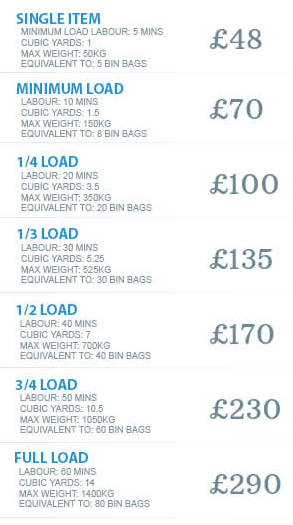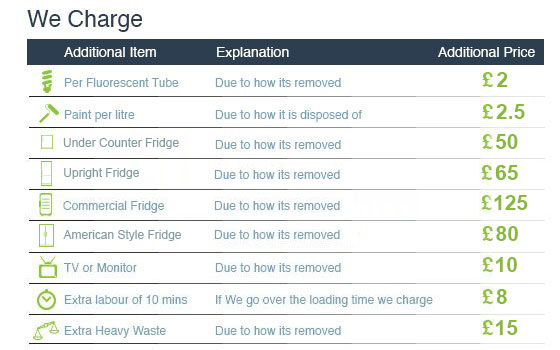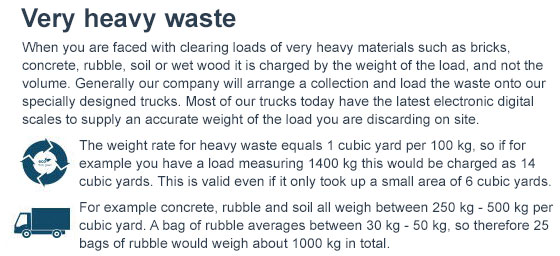Avoid These 10 Common Rubbish Removal Mistakes in the UK
Posted on 22/11/2025
You want your space back. Clean, clear, calm. That's the goal. But truth be told, clearing junk and arranging rubbish removal can spiral into a headache if you slip on the basics. To be fair, it's easy to do: a rushed quote, the wrong skip, a forgotten mattress with springs, or a rogue battery that sparks in the bin lorry. Yeah, we've all been there.
This guide is your friendly, expert walkthrough. We'll show you how to avoid the pitfalls, follow the rules, and save money - while doing the right thing for the planet. We've handled thousands of clearances and worked with councils and licensed carriers up and down the UK, so we'll share what actually works in real homes and businesses. You'll see why people say good rubbish removal is 80% planning, 20% moving stuff.
Why This Topic Matters
Let's face it: waste is rarely just "waste". It's old furniture with memories, office kit that stores private data, or renovation debris that hides hazards. In the UK, getting rubbish removal wrong can mean fines, delays, or environmental harm. Defra's latest figures show over a million fly-tipping incidents reported annually in England - an avoidable mess that costs councils (and taxpayers) dearly. When a rogue collector dumps your items, you can be held responsible under the householder duty of care. That's not just stressful; it's expensive.
Good news: a little planning prevents 90% of problems. Whether you're clearing a spare room in Leeds, a student flat in Bristol, or a cafe in Glasgow, this guide shows you how to avoid these 10 common rubbish removal mistakes in the UK, safely and legally. One small micro-moment: we once helped a family in Reading who were overwhelmed after a loft sort-out; ten minutes of sensible sorting saved them half the cost. You could almost smell the cardboard dust in the air.
Key Benefits
What you get when you plan rubbish removal properly:
- Lower costs: Segregating waste and estimating volume accurately reduces fees and avoids surcharges.
- Legal peace of mind: Compliance with UK regulations protects you from fines and fly-tipping liability.
- Speed and simplicity: Smooth access, clear instructions, and the right container mean fewer return trips.
- Greener outcomes: More re-use and recycling, less landfill, better for the climate and community.
- Safer clearances: Proper handling of batteries, sharp metal, glass, and chemicals avoids injuries and vehicle fires.
- Better resale/donation potential: Salvage value from furniture or electronics offsets costs (sometimes significantly).
Ever tried clearing a room and found yourself keeping everything "just in case"? That's normal. With a plan, you'll move faster and feel lighter when it's done.
Step-by-Step Guidance
Here's a clear, practical sequence used by professional waste managers. Follow it and you'll avoid the classic traps.
- Define the scope, not just the pile. Walk the space with a notepad. List bulky items, bagged rubbish, WEEE (electricals), hazardous items (paint, chemicals), garden waste, and confidential materials. Snap quick photos. In our experience, you'll notice three categories: keep, donate, dispose.
- Estimate volume and weight honestly. Rubbish removal quotes often hinge on cubic yards/metres and labour time. A standard two-seater sofa is ~1.5-2 cubic yards; a builder's bag of rubble is heavy, even if it looks small. Don't guess light. Overfilling skips or misjudging a load is a top reason for extra fees.
- Decide the service type. Options include man-and-van rubbish removal, skip hire, council bulky waste collection, specialist WEEE pickup, or reuse charities. For tight access or mixed waste, vans are flexible. For ongoing building works, a skip can be ideal (with the right permit if on the road).
- Segregate smartly. Create zones: recyclables (paper, card, metals), reusables (clean furniture, working appliances), WEEE, hazardous, general waste. Bag small bits; stack flat-packed cardboard. Keep batteries and vapes in a small lidded tub. It looks fussy. It saves money.
- Check legal requirements. For businesses, prepare waste transfer notes and, for hazardous items, consignment notes. Householders: check the collection company's Waste Carrier Licence (via the Environment Agency's public register). No licence, no collection--simple as that.
- Plan access and timing. Reserve parking, confirm floor level and lift access, note stairs, and measure doorways. In London, consider ULEZ and congestion charge; in tight streets, early morning slots help. If it's raining hard outside that day, lay floor protection to avoid muddy footprints.
- Confirm what's not allowed. Skips and some vans won't take fridges, mattresses, tyres, or liquids without prior notice. Ask about POPs (Persistent Organic Pollutants) rules for upholstered seating - sofas and armchairs often need special handling now.
- Get a written quote and ETA. Insist on volume, labour, disposal fees, and any extra charges (stairs, heavy lifting, out-of-hours) in writing. Ask for photos or a video call quote if you're unsure. Clarity up-front = no awkward surprises later.
- Prepare the space. Clear pathways, dismantle flat-pack items, empty drawers, and keep pets away (they're curious!). Label anything staying. A five-minute tidy reduces the job time by a lot, wierdly more than you expect.
- Collect documentation and proof. After removal, keep copies of the waste transfer note, invoices, and, if possible, disposal facility details. Snap a quick "after" photo. If anyone ever asks, you're covered.
Small story: A landlord in Salford spent ten minutes labelling "keep" vs "take" on cupboard doors. The crew cut a two-hour job down to one. Simple, human, effective.
Expert Tips
- Prioritise re-use before disposal. List items for Freecycle, local Facebook groups, or charity shops. One less cubic yard often saves more than you think.
- Don't break sofas with POPs fabric. The UK's POPs guidance means many upholstered seats must be incinerated intact; cutting fabric spreads contamination. Tell your collector first.
- Keep lithium batteries out of mixed waste. Store them in a non-metal container; take to a battery collection point. Fires in bin lorries start here. Not worth the risk.
- Use clear bags for recyclables. Crews see what's inside; fewer refusals and lower sorting time. Black bags hide hazards and can be rejected.
- Photograph access constraints. A quick snap of stairs, a narrow alley, or low arch saves debate and can adjust the quote fairly ahead of time.
- Bundle metal for value. Keep copper, aluminium, and steel separate; some carriers will discount your load or pay salvage on bigger quantities.
- Check retailer take-back. New large appliances often come with removal of the old one as part of delivery. Saves you a job, and it's compliant under WEEE rules.
- Mind the neighbours. Early Saturday clattering with metal bed frames? Maybe not. Keep it friendly; a short note in the lobby works wonders.
- For businesses: redact or shred paperwork; wipe devices. Data leaks from "rubbish" create real headaches.
- Ask for downstream transparency. Good carriers can tell you where materials go - MRFs, re-use partners, energy-from-waste. Trust is in the details.
Quick aside: you'll sleep better when you know your stuff didn't end up in a layby. It's not just waste; it's your responsibility leaving the door.
Common Mistakes to Avoid
Here it is: the heart of the guide. Avoid these 10 common rubbish removal mistakes in the UK to save time, money, and stress.
- Hiring an unlicensed "cash-in-hand" collector. If your waste is fly-tipped, you can be fined under the householder duty of care. Always verify the Waste Carrier Licence. It takes one minute to check; it can save you hundreds.
- Mixing hazardous items into general waste. Paints, solvents, chemicals, gas bottles, and batteries don't belong in skips or bin bags. Besides safety, it increases disposal costs when found. Keep them separate and ask for proper collection.
- Overfilling a skip or van load. "Heaped" or above the fill line skips are unsafe and illegal to transport. Crews may refuse collection or charge for a second container. Order up a size if you're on the edge.
- Underestimating volume and labour. A loft stuffed with 20 years of life is more than "just a few boxes". Underquote today = surcharge tomorrow. Be honest; photos help providers price fairly.
- Ignoring new POPs rules for sofas and armchairs. Many upholstered items can't be landfilled or resold; they must be incinerated at authorised facilities. Cutting them up spreads contamination. Tell your carrier before collection.
- Forgetting access, parking, and permits. A skip on a public road needs a permit and safety markings. Vans need parking; double yellows at school-run time? Nightmare. Plan it - even cones or a friend holding space can help.
- Leaving data on electronics. Laptops, PCs, printers with hard drives: wipe or destroy data. Businesses should request certificates of data destruction. Protect your privacy, always.
- Throwing batteries and vapes into black bags. It's the quickest way to cause a lorry fire. Separate them - it's simple and could literally save lives.
- Choosing the cheapest quote with no detail. A vague "van load" price can balloon. Look for a breakdown: volume, labour, what's included, surcharges, and where the waste goes. Cheap can be very expensive.
- Skipping re-use and donation opportunities. Good condition furniture or working appliances can be donated or collected by charities. Less to dispose of, more community impact. Win-win.
We could add a bonus mistake: not keeping your paperwork. A month later, if someone asks, you'll wish you had it. Keep it in your email or a simple folder. You'll thank yourself.
Case Study or Real-World Example
Case: Two-bed flat clearance in Croydon
Olivia was moving out of a second-floor flat with no lift. The job: one sofa (POPs), a double mattress, two wardrobes, seven boxes of books, a broken TV, and assorted kitchen bits. It was raining, properly raining, the kind that drums on the railings. She almost booked a cheap "cash" collector. Instead, she checked licences and sent photos to three providers.
- Plan: Man-and-van team, two hours on-site, POPs sofa flagged, batteries in a separate tub, books boxed and labelled, access via back stairwell.
- Cost control: The sofa's POPs disposal was quoted upfront as a fixed line; the rest by cubic yard. She re-used three boxes so the load fit under a cheaper bracket.
- Outcome: 65% of items recycled; 20% donated (books and a chair); 15% energy-from-waste. No extra fees. The team protected the stairwell with runners, so no muddy mess.
- Lesson: Flag the "quirky" items early - sofas, mattresses, WEEE, batteries. One email saved a second trip and a surcharge.
Olivia's words, laughing at the end: "Wasn't expecting that to feel so organised." Same. Clearing can be calm. It really can.
Tools, Resources & Recommendations
Use these UK-focused resources to plan well and stay compliant:
- Environment Agency Public Register: Check a waste carrier's licence quickly.
- GOV.UK: Guidance on waste duty of care, waste transfer notes, and hazardous waste consignment notes.
- Recycle Now Locator: Find local recycling centres, battery banks, and WEEE drop-offs.
- WRAP (Waste & Resources Action Programme): Practical advice on recycling, re-use, and the waste hierarchy.
- Local Council Websites: Bulky waste policies, POPs sofa notices, and skip permit applications vary by borough.
- Charity Collectors: British Heart Foundation, Emmaus, and local re-use networks for furniture/appliance donations.
- Apps: Too Good To Go (for surplus food), Olio (sharing), and local Facebook groups for quick re-homing.
- Specialist Services: Data destruction providers for business IT, and licenced hazardous waste carriers for chemicals and clinical waste.
Tip: Bookmark the carrier checker. It's a 20-second habit that stops a 20-week headache.
Law, Compliance or Industry Standards (UK-focused)
UK waste law isn't just red tape; it's the framework that keeps our streets and countryside clean. Here are the essentials, simplified:
- Environmental Protection Act 1990, Section 34 - Duty of care: Anyone who produces or manages waste must store it safely, use licensed carriers, and ensure proper disposal. Householders have a specific duty to take reasonable steps to prevent fly-tipping.
- Waste Carrier Licence: Any business transporting waste for others must hold a valid licence with the Environment Agency (or equivalents in Scotland/Wales/Northern Ireland).
- Waste Transfer Notes (WTNs): Required when waste changes hands between businesses. Keep records for at least two years. For hazardous waste, use consignment notes and keep for three years.
- Waste Electrical and Electronic Equipment (WEEE) Regulations: Retailers must offer take-back schemes; electricals cannot go in the general waste stream.
- POPs (Persistent Organic Pollutants) in Upholstered Domestic Seating: Many sofas, armchairs, and similar items must be incinerated at authorised facilities; they cannot be landfilled or broken up casually. Councils updated policies in 2023-2024 to reflect this.
- Controlled Waste Regulations 2012: Classes of waste, including commercial and household, impact how it's handled and charged.
- Fly-tipping penalties: Fixed penalty notices for householders repeatedly sit around ?400 (varies by council). Serious cases can lead to court, with unlimited fines and potential imprisonment.
- Skips on the highway: Require permits, safety lights, reflective markings, and cannot obstruct access. Some items (e.g., fridges) are prohibited.
- Data protection (business waste): Confidential documents and data-bearing devices must be destroyed securely; consider certified shredding or ITAD services with certificates of destruction.
Industry practice also follows the Waste Hierarchy: prevent, re-use, recycle, recover, dispose. Build your plan from the top down, not the bottom up. It's better for budgets and the planet.
Checklist
Use this quick pre-collection check. Pin it to the fridge or office wall if you like.
- Photos of all items taken, including access routes
- Items sorted: re-use, recycle, general, WEEE, hazardous
- Batteries and vapes separated into a small lidded tub
- POPs upholstered seating identified (sofas, armchairs)
- Accurate volume estimate confirmed (with measurements)
- Service chosen: van collection, skip, or council bulky
- Carrier licence checked on the public register
- Parking, permits, and timings arranged
- Quote in writing with clear inclusions/exclusions
- Space prepared, pathways cleared, pets safe
- Paperwork collected post-job: invoice, WTN/consignment note
One line to remember: plan first, lift later.
Conclusion with CTA
When you zoom out, rubbish removal isn't about "getting rid of stuff". It's about doing right by your home, your neighbours, and your environment - without overpaying or breaking the rules. If you avoid these 10 common rubbish removal mistakes in the UK, you'll have a smoother, greener, cheaper experience. And, frankly, less faff.
We've seen attics transformed, offices freed, and stress levels drop in minutes. You can do this. Start small, stay safe, and keep your paperwork.
Get a free quote today and see how much you can save.
Take a breath. A clearer space is closer than you think.


















